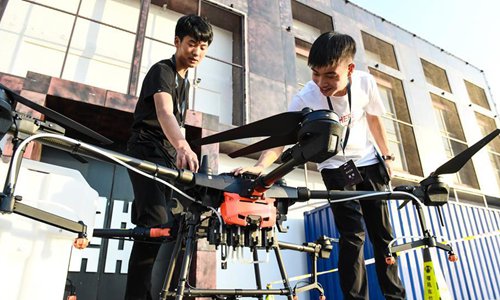HOME >> SOURCE
Japan’s plan to block DJI drones unfounded: company
By Song Lin and Li Xuanmin Source:Global Times Published: 2019/12/10 19:28:41

A visitor gets to know more about Chinese drone maker DJI's latest crop protection drone, the T20, at a product launch event in Shenzhen, south China's Guangdong Province, Nov. 5, 2019. Besides the new T20 crop protection drone, DJI also introduced an upgraded version of the drone's spray system as well as appertaining service and training plans on Tuesday. (Xinhua/Mao Siqian)
In response to a report that the Japan Coast Guard plans to remove Chinese drone maker DJI from its procurement list under the guise of information security, DJI said that it regrets any restriction based on unfounded information and will continue to engage in talks with relevant Japanese departments.
The Japan Coast Guard plans to stop using and procuring Chinese-made drones in 2020 due to concerns over information security, Japan-based Nikkei reported on Monday.
The restriction is based on unfounded facts, DJI noted in a statement sent to the Global Times. DJI has explained its efforts in data security to Japanese media and will further strive to cultivate standards of drone technology, form a fair environment for all technology providers and ensure the satisfaction of customers.
Being merely a proposal, the move so far has had a limited impact on DJI's business in Japan, a source close to the matter told the Global Times on condition of anonymity on Tuesday, without disclosing details of the company's sales in Japan.
Asian countries like Japan and South Korea tend to take a more cautious attitude in aligning with the US stance, so DJI is still taking a wait-and-see approach, the source disclosed.
The essential stance of Japan toward Chinese cutting-edge technology is the same as that of the US, which is trying to hinder China's development, said Zhang Jifeng, a vice director of the Institute of Japanese Studies at the Chinese Academy of Social Sciences.
However, Japan's implementation of measures restricting Chinese companies, including Huawei and DJI, may vary from that of the US for the sake of its own interests, Zhang said, noting that the ultimate effect is still unclear and may not amount to much.
Given China's development in various areas, Japan would take a flexible policy instead of simply following in the US' steps, he said.
Though Japan has already banned Huawei from government procurement contracts, 80 percent of its big companies are still choosing to do business with Huawei, including Sony and Panasonic, showed polls from Nikkei in October.
DJI has a global market share of more than 70 percent, according to the Xinhua News Agency. Experts said that such restrictions will exist for some time, and Chinese technology companies need to firmly develop their technology and products. Countries that decline to use these products will suffer the loss.
Posted in: INDUSTRIES